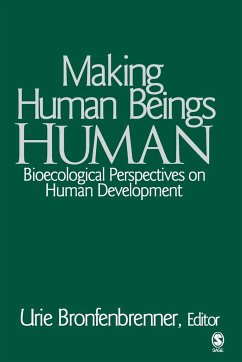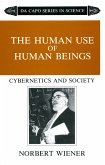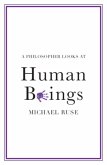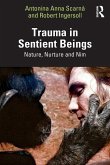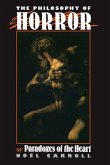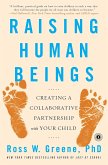Urie BronfenbrennerBioecological Perspectives on Human Development
Making Human Beings Human
Bioecological Perspectives on Human Development
Herausgeber: Bronfenbrenner, Urie
Urie BronfenbrennerBioecological Perspectives on Human Development
Making Human Beings Human
Bioecological Perspectives on Human Development
Herausgeber: Bronfenbrenner, Urie
- Broschiertes Buch
- Merkliste
- Auf die Merkliste
- Bewerten Bewerten
- Teilen
- Produkt teilen
- Produkterinnerung
- Produkterinnerung
Shows the historical development of the bioecological model and the ecology of human development. This book presents cultural and historical comparisons. It explores the concepts of the bioecological model and the ecology of human development which represent a contribution to the field of developmental psychology.
Andere Kunden interessierten sich auch für
![The Human Use of Human Beings The Human Use of Human Beings]() Norbert WienerThe Human Use of Human Beings20,99 €
Norbert WienerThe Human Use of Human Beings20,99 €![A Philosopher Looks at Human Beings A Philosopher Looks at Human Beings]() Michael Ruse (Florida State University)A Philosopher Looks at Human Beings19,99 €
Michael Ruse (Florida State University)A Philosopher Looks at Human Beings19,99 €![Trauma in Sentient Beings Trauma in Sentient Beings]() Antonina Anna ScarnàTrauma in Sentient Beings41,99 €
Antonina Anna ScarnàTrauma in Sentient Beings41,99 €![The Book of Barely Imagined Beings The Book of Barely Imagined Beings]() Caspar HendersonThe Book of Barely Imagined Beings11,57 €
Caspar HendersonThe Book of Barely Imagined Beings11,57 €![The Philosophy of Horror The Philosophy of Horror]() Noel CarrollThe Philosophy of Horror68,99 €
Noel CarrollThe Philosophy of Horror68,99 €![The Management Style of the Supreme Beings The Management Style of the Supreme Beings]() Tom HoltThe Management Style of the Supreme Beings17,99 €
Tom HoltThe Management Style of the Supreme Beings17,99 €![Raising Human Beings Raising Human Beings]() Ross W. GreeneRaising Human Beings20,99 €
Ross W. GreeneRaising Human Beings20,99 €-
-
-
Shows the historical development of the bioecological model and the ecology of human development. This book presents cultural and historical comparisons. It explores the concepts of the bioecological model and the ecology of human development which represent a contribution to the field of developmental psychology.
Hinweis: Dieser Artikel kann nur an eine deutsche Lieferadresse ausgeliefert werden.
Hinweis: Dieser Artikel kann nur an eine deutsche Lieferadresse ausgeliefert werden.
Produktdetails
- Produktdetails
- The Sage Program on Applied Developmental Science
- Verlag: SAGE Publications Inc
- Seitenzahl: 338
- Erscheinungstermin: 1. Juni 2004
- Englisch
- Abmessung: 229mm x 152mm x 18mm
- Gewicht: 484g
- ISBN-13: 9780761927129
- ISBN-10: 0761927123
- Artikelnr.: 22365244
- Herstellerkennzeichnung
- Libri GmbH
- Europaallee 1
- 36244 Bad Hersfeld
- gpsr@libri.de
- The Sage Program on Applied Developmental Science
- Verlag: SAGE Publications Inc
- Seitenzahl: 338
- Erscheinungstermin: 1. Juni 2004
- Englisch
- Abmessung: 229mm x 152mm x 18mm
- Gewicht: 484g
- ISBN-13: 9780761927129
- ISBN-10: 0761927123
- Artikelnr.: 22365244
- Herstellerkennzeichnung
- Libri GmbH
- Europaallee 1
- 36244 Bad Hersfeld
- gpsr@libri.de
Urie Bronfenbrenner is the Jacob Gould Schurman Professor Emeritus of Human Development and Psychology at Cornell University. He is best known as the founder and principal protagonist of his ground-breaking theory of the "Ecology of Human Development." Bronfenbrenner is one of the founders of Head Start and the recipient of numerous distinguished awards including six honorary degrees, three from European universities. He was the first recipient of the American Psychological Association′s annual Bronfenbrenner Award for Lifetime Contribution to Developmental Psychology in the Service of Science and Society. He has taught, lectured, consulted, and carried out research in the United States and all over the world, mainly in both Eastern and Western Europe, Japan, and Australia. His publications have been extensive and far-reaching . Urie Bronfenbrenner is a member of the American Academy of Arts and Sciences, American Psychological Society, American Psychological Association, Society for Research in Child Development, National Academy of Education, and the International Society for the Study of Behavioral Development. Bronfenbrenner received his Bachelor′s degree in Psychology and Music from Cornell University, his Master′s Degree from Harvard University, and his Doctorate from the University of Michigan. After service in the Armed Forces and a brief period at the University of Michigan, he returned to Cornell University for a long productive life of research and teaching, as well as assisting with the raising of his six children. Since his retirement in 1987, he has continued to research, to write, to teach, and to travel extensively.
Acknowledgements
Dedication
Foreword - Richard M. Lerner
Introduction
Section I: ON THE NATURE OF BIOECOLOGICAL THEORY AND RESEARCH
Section Introduction
Article 1. The Bioecological Theory of Human Development (2001)
Article 2. Social Ecology over Time and Space (1995)
Article 3. Social Status, Structure, and Development in the Classroom Group
(1942)
Article 4. Social Ecology of Human Development (1973)
Article 5. Lewinian Space and Ecological Substance (1977)
Article 6. A Future Perspective (1979)
Article 7. Toward a Critical History of Development. A Propaedeutic
Discussion (1986)
Article 8. Interacting Systems in Human Development. ResearchParadigms:
Present and Future (1988)
Article 9. Developing Ecology (1989)
Article 10. Ecological Systems Theory (1992)
Article 11. Heredity, Environment and the Question "How." A First
Approximation (1993)
Section II: USING THE ECOLOGY OF HUMAN DEVELOPMENT TO ENHANCE THE HUMAN
CONDITION
Section Introduction
Article 12. Growing Chaos in the Lives of Children and Families. How Can We
Turn it Around? (2001)
Article 13. The Split Level American Family (1967)
Article 14. Minority Report of Forum 15- 1970 White House Conference on
Children (1970)
Article 15. Two Worlds of Childhood: U.S. and U.S.S.R. (1970)
Article 16. Is 80% of Intelligence Genetically Determined? (1975)
Article 17. The Future of Childhood (1985)
Article 18. Strengthening Family Systems (1988)
Article 19. Child Care in the Anglo-Saxon Mode (1992)
Afterword - Stephen F. Hamilton and Stephen J. Ceci
Dedication
Foreword - Richard M. Lerner
Introduction
Section I: ON THE NATURE OF BIOECOLOGICAL THEORY AND RESEARCH
Section Introduction
Article 1. The Bioecological Theory of Human Development (2001)
Article 2. Social Ecology over Time and Space (1995)
Article 3. Social Status, Structure, and Development in the Classroom Group
(1942)
Article 4. Social Ecology of Human Development (1973)
Article 5. Lewinian Space and Ecological Substance (1977)
Article 6. A Future Perspective (1979)
Article 7. Toward a Critical History of Development. A Propaedeutic
Discussion (1986)
Article 8. Interacting Systems in Human Development. ResearchParadigms:
Present and Future (1988)
Article 9. Developing Ecology (1989)
Article 10. Ecological Systems Theory (1992)
Article 11. Heredity, Environment and the Question "How." A First
Approximation (1993)
Section II: USING THE ECOLOGY OF HUMAN DEVELOPMENT TO ENHANCE THE HUMAN
CONDITION
Section Introduction
Article 12. Growing Chaos in the Lives of Children and Families. How Can We
Turn it Around? (2001)
Article 13. The Split Level American Family (1967)
Article 14. Minority Report of Forum 15- 1970 White House Conference on
Children (1970)
Article 15. Two Worlds of Childhood: U.S. and U.S.S.R. (1970)
Article 16. Is 80% of Intelligence Genetically Determined? (1975)
Article 17. The Future of Childhood (1985)
Article 18. Strengthening Family Systems (1988)
Article 19. Child Care in the Anglo-Saxon Mode (1992)
Afterword - Stephen F. Hamilton and Stephen J. Ceci
Acknowledgements
Dedication
Foreword - Richard M. Lerner
Introduction
Section I: ON THE NATURE OF BIOECOLOGICAL THEORY AND RESEARCH
Section Introduction
Article 1. The Bioecological Theory of Human Development (2001)
Article 2. Social Ecology over Time and Space (1995)
Article 3. Social Status, Structure, and Development in the Classroom Group
(1942)
Article 4. Social Ecology of Human Development (1973)
Article 5. Lewinian Space and Ecological Substance (1977)
Article 6. A Future Perspective (1979)
Article 7. Toward a Critical History of Development. A Propaedeutic
Discussion (1986)
Article 8. Interacting Systems in Human Development. ResearchParadigms:
Present and Future (1988)
Article 9. Developing Ecology (1989)
Article 10. Ecological Systems Theory (1992)
Article 11. Heredity, Environment and the Question "How." A First
Approximation (1993)
Section II: USING THE ECOLOGY OF HUMAN DEVELOPMENT TO ENHANCE THE HUMAN
CONDITION
Section Introduction
Article 12. Growing Chaos in the Lives of Children and Families. How Can We
Turn it Around? (2001)
Article 13. The Split Level American Family (1967)
Article 14. Minority Report of Forum 15- 1970 White House Conference on
Children (1970)
Article 15. Two Worlds of Childhood: U.S. and U.S.S.R. (1970)
Article 16. Is 80% of Intelligence Genetically Determined? (1975)
Article 17. The Future of Childhood (1985)
Article 18. Strengthening Family Systems (1988)
Article 19. Child Care in the Anglo-Saxon Mode (1992)
Afterword - Stephen F. Hamilton and Stephen J. Ceci
Dedication
Foreword - Richard M. Lerner
Introduction
Section I: ON THE NATURE OF BIOECOLOGICAL THEORY AND RESEARCH
Section Introduction
Article 1. The Bioecological Theory of Human Development (2001)
Article 2. Social Ecology over Time and Space (1995)
Article 3. Social Status, Structure, and Development in the Classroom Group
(1942)
Article 4. Social Ecology of Human Development (1973)
Article 5. Lewinian Space and Ecological Substance (1977)
Article 6. A Future Perspective (1979)
Article 7. Toward a Critical History of Development. A Propaedeutic
Discussion (1986)
Article 8. Interacting Systems in Human Development. ResearchParadigms:
Present and Future (1988)
Article 9. Developing Ecology (1989)
Article 10. Ecological Systems Theory (1992)
Article 11. Heredity, Environment and the Question "How." A First
Approximation (1993)
Section II: USING THE ECOLOGY OF HUMAN DEVELOPMENT TO ENHANCE THE HUMAN
CONDITION
Section Introduction
Article 12. Growing Chaos in the Lives of Children and Families. How Can We
Turn it Around? (2001)
Article 13. The Split Level American Family (1967)
Article 14. Minority Report of Forum 15- 1970 White House Conference on
Children (1970)
Article 15. Two Worlds of Childhood: U.S. and U.S.S.R. (1970)
Article 16. Is 80% of Intelligence Genetically Determined? (1975)
Article 17. The Future of Childhood (1985)
Article 18. Strengthening Family Systems (1988)
Article 19. Child Care in the Anglo-Saxon Mode (1992)
Afterword - Stephen F. Hamilton and Stephen J. Ceci

